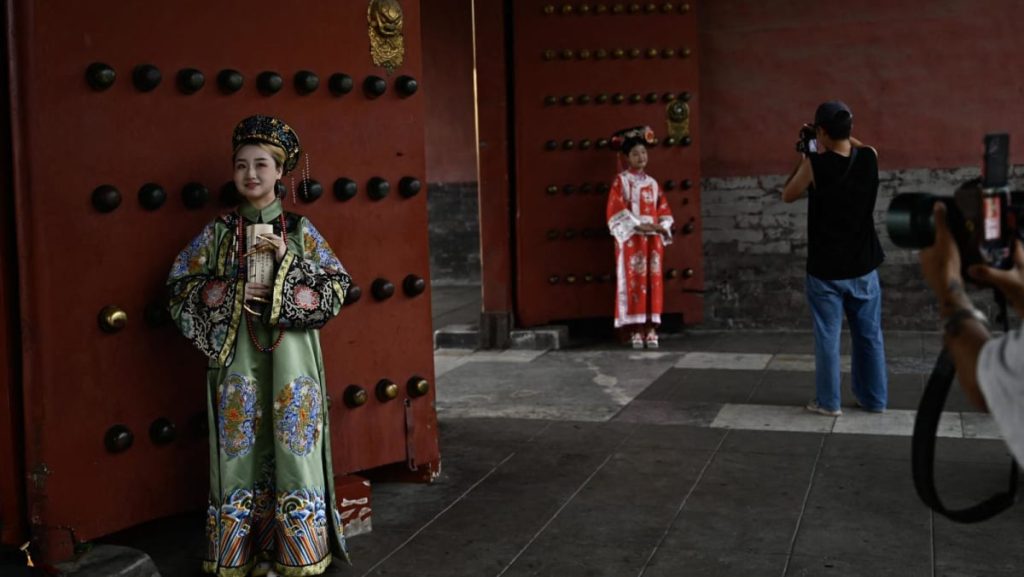The serene atmosphere of Beijing’s historical parks and temples, including the panoramic Jingshan Park overlooking the Forbidden City and the majestic Temple of Heaven, has been increasingly disrupted by the intrusive presence of commercial photographers. These locations, intended for public enjoyment and cultural appreciation, have become backdrops for elaborate photoshoots, often impeding the experience of regular visitors. Signs posted in these locations, citing official park regulations, now explicitly prohibit commercial photography and other activities that “disturb the appearance of the parks and tour order,” reflecting a growing effort to reclaim these spaces for their intended purpose. The move has been met with widespread public support, particularly on social media platforms like Xiaohongshu, where users have shared their frustrations and welcomed the enforcement of these regulations. This burgeoning issue underscores the tension between commercial interests and public access in shared cultural spaces, prompting authorities to take action to protect the visitor experience.
The implementation of these regulations stems from mounting complaints about the disruptive behavior of commercial photographers. These professionals, often equipped with bulky equipment, costumes, and props, transform tranquil park settings into makeshift studios. Their activities often involve occupying prime locations for extended periods, causing congestion and preventing other visitors from enjoying the scenery or taking their own photos. Beyond the physical disruption, some photographers have been accused of soliciting and even scamming tourists, adding another layer of concern to the issue. The collective impact of these behaviors has led to a degradation of the visitor experience, prompting park authorities to intervene and restore order.
The regulations, as clarified by the Beijing Municipal Administration Center of Parks, aim to strike a balance between accommodating personal photography and curbing disruptive commercial activities. While visitors are still welcome to wear traditional clothing and capture their own memories, commercial photography, live-streaming, and video-taking are strictly prohibited without prior permission. This distinction acknowledges the rights of individuals to document their visits while preventing the exploitation of these public spaces for commercial gain. The regulations are grounded in Article 38 of the Beijing Tourism Regulations, which empowers scenic spots to take measures against unauthorized activities, including setting up stalls and occupying public areas. This legal framework provides the necessary authority to enforce the ban and address the issue effectively.
The response on social media platforms like Xiaohongshu has been overwhelmingly positive, with users sharing anecdotes of encounters with disruptive commercial photographers and expressing relief at the newly enforced regulations. One user recounted an incident at the Temple of Heaven where a photographer monopolized a popular photo spot, causing long queues and even resorting to verbally abusing other visitors. Another user lamented the prevalence of commercial photography in museums, emphasizing the desire to appreciate the exhibits without being surrounded by intrusive photoshoots. These shared experiences highlight the widespread frustration with the issue and the strong public support for measures to curb it.
The Beijing Daily newspaper further clarified the regulations, emphasizing the distinction between personal and commercial photography. Park workers at the Temple of Heaven reiterated that visitors are welcome to wear traditional attire and take photos for personal use, but commercial photography remains strictly prohibited. This clarification aims to alleviate any confusion and ensure that visitors understand the boundaries and can continue to enjoy the cultural experience without fear of inadvertently violating the rules. The park’s proactive communication demonstrates a commitment to transparency and addressing public concerns.
The issue of commercial photography disrupting public spaces is not unique to Beijing but reflects a broader global challenge in balancing commercial interests with public access to shared cultural heritage. As tourism continues to grow and social media fuels the demand for visually appealing content, the pressure on popular locations intensifies. The case of Beijing’s parks and temples provides a valuable example of how authorities can respond to these challenges by implementing regulations, clarifying permissible activities, and engaging with the public to ensure a positive and respectful environment for all visitors. The successful implementation of these regulations in Beijing could serve as a model for other destinations facing similar issues, promoting sustainable tourism and preserving the integrity of cultural spaces for future generations.

